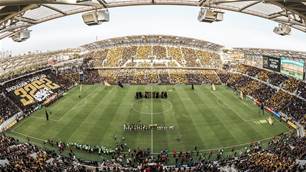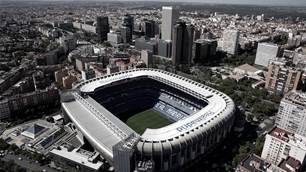THE problem: The world's biggest club hasn't won anything in years. The solution: Jose Mourinho...
The problem
A galactic model means a galactico every summer - even if the coach doesn't want one...
Asked about the players he wanted to sign during his presentation, Mourinho replied: "I am not interested in big names; I think we need three or four defensive players." His predecessors would have been tempted to mutter, "Yeah, right - like you've got anything to do with it." Rafa Benitez famously complained that Valencia had bought him a sofa when he asked for a lamp. Madrid have a habit of buying 15 sofas and no lamps. Or carpets. Or light fittings. Or, in fact, a home to put them in.
"A Ferrari," Carlos Queiroz said when he was at Madrid, "can't run without tyres." Another former manager sighed, "If they buy another striker, I'm going to have to write to FIFA to ask them to let us use only half the pitch." And Manuel Pellegrini complained: "No one asked me anything about how to build the team. Arjen Robben and Wesley Sneijder were vital players but they left - and they ended up in the Champions League final."
As for buying players to fit your system, forget it. Real Madrid fit their system around their players, crowbarring in as many of them as they can. Arrigo Sacchi, Madrid's one-time sporting director, recalled: "One day I said to Perez,
'What would your ideal starting XI be?' He put Beckham at right-back and Zidane at centre-back, because he had so many attackers."
The solution
Get your own way. And if not, make sure everyone knows about it...
Control over signings was a condition of Mourinho's arrival. When Perez announced that "this year's galactico is Mourinho", he said it all. Roman Abramovich once showed Mourinho a list of Russians he was interested in signing. The coach simply went through the list and crossed every one out. For him, hunger and personality are more important than talent.
He has insisted before that you can only win the league with "strong centre-backs, a striker who scores in his few chances and someone who is dangerous from dead balls." As Didier Drogba puts it: "Mourinho doesn't have players; he has people who are ready to adapt to his philosophy - and they are not necessarily the best players in the world."
If the promise is broken, Mourinho will not bite his tongue. Pellegrini spoke up when he left, by which time it was too late. Mourinho has always felt bold enough to speak out while he was still at his clubs - even if it did eventually cost him his job at Chelsea. When the London club ignored his demands to get a centre-back, he publicly announced: "We needed a bit of help in December and that was denied to us."
The problem
It's not just that Madrid sign galacticos - it's that you have to play them...
Galacticos are "investments", necessary for the financial success of the whole project. They have to be on display. The model demands style as well as success; glamour as well as guts. Mariano Garcia Remon was once asked who he thought he was to leave the Brazilian Ronaldo out of the side, to which he replied: "The coach." He was soon the ex-coach. Meanwhile, Vicente del Bosque admitted to Steve McManaman that his hands were tied: he was, in his own words, "just an employee" and certain players had to play.
The solution
Call their bluff, let them rot...
Not with Mourinho they won't. And if Perez insists, ask him what he has won. He'll find it's less than you have. You can always threaten to walk too: Perez knows that Mourinho is a last throw of the dice. After going through seven coaches in four years, he can't afford another sacking. If Mourinho, like every other coach Perez has signed, wins nothing, some might reach the conclusion that the coach is not the problem. Which helps to explain why Perez is prepared to put some demands on hold.
The problem
Real Madrid think it's all about stars. Tactics are just those green and orange things...
So ingrained was the assumption that the world's best players were so good that everything else was obsolete, meaning any serious preparation went out the window - as if somehow training and tactics were beneath them. "I hardly ever saw Del Bosque," recalled McManaman, who spent four seasons at the Bernabeu under the Spanish coach.
The solution
The devil's in the detail...
Bobby Robson recalled that even as an assistant, Mourinho's reports on other sides were "absolutely first class - the best I have seen". Drogba adds: "There was an almost surgical precision about what he said would happen. It was frightening how often he was exactly right - as if he could see into the future."
Not that players are force-fed endless information. Instead, Mourinho adopts a process of "guided discovery". He regularly stops training sessions to ask his squad what they think. His training sessions are inventive, varied and also short, to prevent boredom - "Never," he insists, "more than an hour and a half long."
"If I ever had to take a session and didn't know what to do, I asked Jose," recalls Louis van Gaal. "He always had an idea." And it always included a ball. After all, says Mourinho's right-hand man Rui Faria, "When did you ever see a pianist run around a piano without touching the keys?"
The problem
Players think they're bigger than you...
During one training session, Jose Antonio Camacho was trying to get his players to perform a drill when Zinedine Zidane turned round and snapped: "Who are you to tell me what to do?" What could he say?
The solution
They're not. And anyway, you can win them over
Mourinho can say plenty. He's won two Champions League trophies. But it's not just about success. Robson recalled how Mourinho was able to develop a relationship with Barcelona's players, even when some in Spain were deriding him as a mere translator. Mourinho was very conscious of the dangers: "At Barcelona, with those
players, the old routine of 'the coach is important' does not apply." He had to find a way of winning them over. He did. He always does.
That he invariably succeeds was illustrated by the sobbing, heart-wrenching embrace between Mourinho and Marco Materazzi after the Champions League final and the ultimately aborted players' revolt that followed his
sacking at Stamford Bridge. When he won his first Champions League the scenes were similar. "When the third goal went in, I went and hugged Mourinho, not a team-mate," recalls Porto's Jorge Costa. "It felt right."
When Frank Lampard did likewise after winning the Premier League, Mourinho declared: "What you saw was more than a hug - it was trust."
But how do you win them over? Now there's a question: the crux of the issue; Mourinho's secret. Robson always insisted that while he was extremely self-confident, Mourinho was "not arrogant". Victor Baia describes him as a "funny" man able to make players "feel important". He's a listener, too. A former Barcelona player describes him as "a sponge, soaking everything up", while at Chelsea he sent a player home to look after his sick son, allowing him to miss a match. He then publicly made an excuse for him; it remained between them.
Communication is key: at Inter, Mourinho studied Italian for five hours a day to ensure he could effectively reach his squad. At Barcelona, Oscar Garcia recalls that even as an assistant coach, "Mourinho was charismatic and
always knew exactly what to say - he was supremely eloquent and a very good judge of character. By acting as Bobby's link to the squad he was able to play both sides and be everyone's confidant." He was also able to
take new things on board and adapt to circumstance. One Barcelona player says that, under Van Gaal, he simply couldn't believe how wholeheartedly Mourinho had adopted the Dutch model. "You were looking at him and thinking: has this Portuguese bloke spent his whole life at the Ajax school?"
There are no forced, awkward attempts at bonding. Mourinho famously responded to his Chelsea predecessor Claudio Ranieri's decision to show his players Gladiator as a motivational tool before one match: "If I did that they'd just laugh at me and think I was sick." And he's happy to let his players relax - as the Porto player dancing on a pool table with a pair of recently acquired knickers on his head as Mourinho walked into the bar can testify. After one defeat in Portugal, Mourinho called over a player and told him to go and inform the rest of the squad that there was good news: "It's over. Go and enjoy yourselves - forget it." They won the second leg.
Not that he always plays Mr Nice Guy. Deco recalls how Mourinho manipulated the Portuguese midfielder, Maniche [see page 39]: "Mourinho knew that Maniche was important for the side and also a very emotional guy, but not always motivated. So a week or two before each game, he would drop him for a less important match. When he came back into the team, he would be furious and try to make a point. It worked every time. Maniche never realised how he was being played."
Others who found themselves dropped appreciated the strict fairness with which Mourinho treated them. The first thing he did upon buying Paulo Ferreira for Chelsea was phone Glen Johnson. "He was always very direct; very honest," adds Costa.
He was also crafty - a sharp political animal. At Barcelona he would look at players like Guardiola, realise just how important they were in the dressing room and, in Robson's words, think, "I have got to get in with this guy." It was no coincidence that Mourinho courted Materazzi or that he has begun his Real Madrid career serenading Raul. Likewise, he always seeks an assistant he can trust who knows the club - both as a way of showing his respect for the institution and to ensure that he has a guide to the internal idiosyncrasies at the club. He did it with Steve Clarke at Stamford Bridge. At the Bernabeu he will be aided by the club's former defender Aitor Karanka.
Continued on next page...
Related Articles

What A-League clubs can learn from MLS dazzlers LAFC

An Aussie in the MLS: Zlatan, LA Galaxy and me












